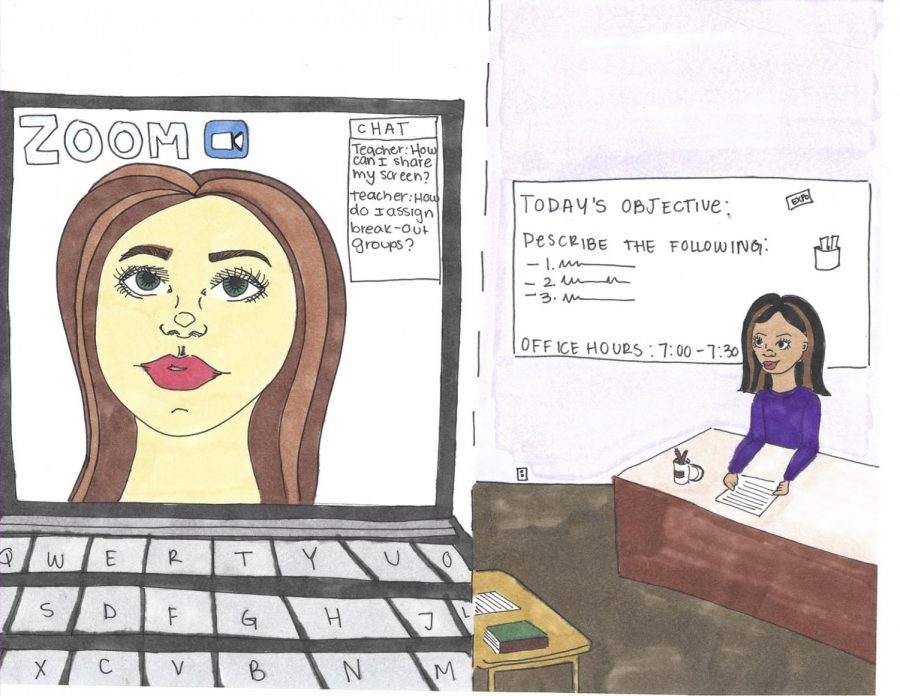Stressed at a desk
DM teachers overcome obstacles to teach virtually
Illustrator Nora Khaled used blank paper alcohol based markers and fine-tipped pens to portray the challenges faced this school year by teachers, who said the lessons learned while teaching Enhanced Distance Learning during the first quarter will help them as they transition to online. “Even though before having to go online I was always a paper and pencil person, I will definitely consider using technology in the future,” said Mrs. Varosky, who teaches freshman English at DM. About 85 percent of DM students returned to in person instruction on Oct. 12.
October 5, 2020
Dealing with distractions. Coping with the cats. Being able to ever leave work. These are a few problems teachers dealt with while working from home.
“I had trouble with separating my work and home life,” said DM teacher Mrs. Varosky. She has finally adopted the habit of stopping work at 6:00 p.m. at the latest. Until then, she battled multiple distractions, including a wall with the television, cats strolling across the computer at inopportune times–and, of course, constantly seeing her bed: a constant reminder of the nap she couldn’t take.
But the physical issues weren’t the only adjustments teachers were forced to make.
Mrs. Natasha Anderson’s sports medicine class is very hands-on which is difficult to teach virtually–providing Mrs. Anderson an opportunity for creativity in her lessons. She spends a lot more time prepping for classes than before, researching for free resources that her class can use. When returning back to school, all the research won’t be wasted; Anderson said she would incorporate some of her virtual resources back into the classroom.
The virtual world provided some advantages, Mrs. Anderson said. Reaching out to students in school was easier.
“I try to make my students know that they can come talk to me anytime, anywhere, about everything,” said Mrs. Anderson, adding that she hoped students feel comfortable to talk to teachers any time if needed.
The increased need to address student health caused a concern by some regarding liability. “Every single day there’s a lawsuit waiting to happen,” Dr. Hirsch said. Still, teachers shouldn’t be afraid to reach out to students, said Dr. Hirsch, adding that lab time during Enhanced Distance Learning provided a good opportunity to meet students one on one.
The emotional health of students–along with their educational needs–was a concern of many teachers during EDL.
“As a teacher, I’m worried that I’m not delivering instructions well enough. But as a person I’m worried about students being left behind and having to deal with mental health on their own,” said Mrs. Varosky, who teaches freshman English.
Students, meanwhile, recognized the challenges that teachers faced. “They don’t have a lot of time to plan,” said DM freshman Desireè McCreary.
Added DM student Alexis Segaline: “I think it’s difficult for them, but at the same time they need to understand we have technology problems too.”
Three committees–he incident committee, the safety committee and the curriculum committee–were formed in August by Dr. Hirsch to prepare. Teachers in August received their official training in Microsoft Teams, Google Classroom and Buzz, giving them only a week to prepare for the start of school. Dr. Hirsch said that, “training on Buzz was not extraordinary at first.”
Mrs. Varosky said, “I had teachers come to me stressed that they couldn’t get anything to work.”
Communication was the key to overcome the initial concerns and problems, said Dr. Hirsch, who predicted that there would be some concerns.
“By instinct I had a once a week voluntary staff meeting, where they could tell me what they were thinking and I could tell them what I was thinking,” said Dr. Hirsch adding that between 80 and 90 staff attended the meetings.
As DM is transitioning from EDL to hybrid, many teachers said that EDL has taught them some of the value of technology in the classroom.
“Even though before having to go online I was always a paper and pencil person, I will definitely consider using technology in the future,” said Mrs. Varosky.
Varosky said that despite some of the conveniences, she is looking forward to returning to the classroom.
Though Mrs. Varosky has a 45-minute drive to DM each day, she does miss being in her classroom. Mrs. Varosky said, “I miss the chatter in my classroom, and the phones hidden under the desks.”




Mrs. Varosky • Nov 4, 2020 at 10:30 am
I may be a bit biased, but great write-up! 🙂
Alastair Harrington • Nov 3, 2020 at 7:27 pm
This is a wonderful story, it is breathtaking & I’ve never read something as inspirational. Well done to who wrote this magnificent story. It taught me alot about this topic that I didn’t know before, thanks for enlightening me.